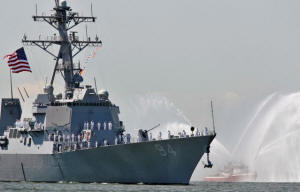|
Iran vessels make 'high speed intercept'
of U.S. ship: U.S. official
 Send a link to a friend
Send a link to a friend
 [August 25, 2016]
By Idrees Ali [August 25, 2016]
By Idrees Ali
WASHINGTON (Reuters) - Four of Iran's
Islamic Revolutionary Guard Corps (IRGC) vessels "harassed" a U.S.
warship on Tuesday near the Strait of Hormuz, a U.S. defense official
said, amid Washington's concerns about Iran's posture in the Gulf and in
the Syrian civil war.
The official, speaking on the condition of anonymity, said on Wednesday
that two of the Iranian vessels came within 300 yards of the USS Nitze
in an incident that was "unsafe and unprofessional."
The vessels harassed the destroyer by "conducting a high speed intercept
and closing within a short distance of Nitze, despite repeated
warnings," the official said.
IRGC, the Islamic Republic's praetorian guard, is suspicious of U.S.
military activity near Iran's borders and appears to be sticking to a
familiar posture in the Gulf that predates last year's nuclear accord
between Iran and six world powers, including the United States.
The United States and other countries are concerned about Iran's support
for Syrian President Bashar al-Assad, its ballistic missile program, and
its backing for Shiite militias that have abused civilians in Iraq.

The U.S. defense official said that in Tuesday's incident the USS Nitze
tried to communicate with the Iranian vessels 12 times, but received no
response. It also fired 10 flares in the direction of two of the Iranian
vessels.
"The Iranian high rate of closure... created a dangerous, harassing
situation that could have led to further escalation, including
additional defensive measures by Nitze," the official said.
USS Nitze had to change course in order to distance itself from the
Iranian vessels, the official said, adding that the incident could have
led to a diplomatic protest, but the United States does not have
diplomatic relations with Iran.
It remains to be seen whether these actions were carried out by rogue
Revolutionary Guard commanders or sanctioned by senior officials in
Tehran, said Karim Sadjadpour, an Iran expert at the Carnegie Endowment
for International Peace.
[to top of second column] |

The USS Nitze, a Guided Missile Destroyer is greeted by the spray of
a fireboat to kick off Fleet Week in New York Harbor, May 24, 2006.
Fleet Week will run through May 30, featuring extensive naval and
military display for the public. REUTERS/Peter Foley

"For four decades the Revolutionary Guard have been told that
America is the greatest threat to the Islamic Revolution," said
Sadjadpour. "This institutional culture hasnít changed after the
nuclear deal," he added.
In January, 10 U.S. sailors aboard two patrol craft were detained by
the IRGC when they inadvertently entered Iranian territorial waters.
They were released the next day after being held for about 15 hours.
The Gulf separates Iran from its regional rival Saudi Arabia and a
U.S. naval base in Bahrain.
(Reporting by Idrees Ali. Additional reporting by Warren Strobel;
Editing by Grant McCool and Andrew Hay)
[© 2016 Thomson Reuters. All rights
reserved.]
Copyright 2016 Reuters. All rights reserved. This material may not be published,
broadcast, rewritten or redistributed.

 |